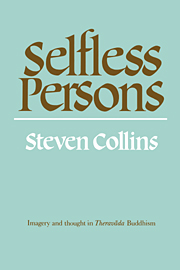Book contents
- Frontmatter
- Contents
- Dedication
- Preface
- Introduction
- Part I The cultural and social setting of Buddhist thought
- Part II The doctrine of not-self
- Part III Personality and rebirth
- 5 The individual of ‘conventional truth’
- 6 ‘Neither the same nor different’
- Part IV Continuity
- Conclusion
- Notes
- Bibliography
- Glossary and index of Pali and Sanskrit terms
- General index
6 - ‘Neither the same nor different’
Published online by Cambridge University Press: 18 December 2009
- Frontmatter
- Contents
- Dedication
- Preface
- Introduction
- Part I The cultural and social setting of Buddhist thought
- Part II The doctrine of not-self
- Part III Personality and rebirth
- 5 The individual of ‘conventional truth’
- 6 ‘Neither the same nor different’
- Part IV Continuity
- Conclusion
- Notes
- Bibliography
- Glossary and index of Pali and Sanskrit terms
- General index
Summary
Another occasion the mind often takes of comparing, is the very being of things; when, considering anything as existing at any determined time and place, we compare it with itself existing at another time, and thereon form the ideas of identity and diversity.
John Locke, An Essay concerning Human Understanding, Book 2, Chapter 27If I say ‘it will not be me, but one of my future selves’, I do not imply that I will be that future self. He is one of my later selves, and I am one of his earlier selves. There is no underlying person who we both are …
It is sometimes thought to be especially rational to act in our own best interests. But I suggest that the principle of self-interest has no force. There are only two genuine competitors in this particular field. One is the principle of biased rationality: do what will best achieve what you actually want. The other is the principle of impartiality: do what is in the best interests of everyone concerned.
Derek Parfit (1971)At this point in my study of Buddhist thought, I will turn to some of those questions which I mentioned in the Introduction as arising from the denial of self. I will try to show where in Buddhist thinking we should look for an answer to them, and thus how the taboo on speaking of ‘self’ or ‘person’ in ‘ultimate’ discourse is integrated into a psychological and moral attitude of greater coherence than that which the doctrinal rigidity of the denial of self might seem to imply.
- Type
- Chapter
- Information
- Selfless PersonsImagery and Thought in Theravada Buddhism, pp. 177 - 196Publisher: Cambridge University PressPrint publication year: 1982

